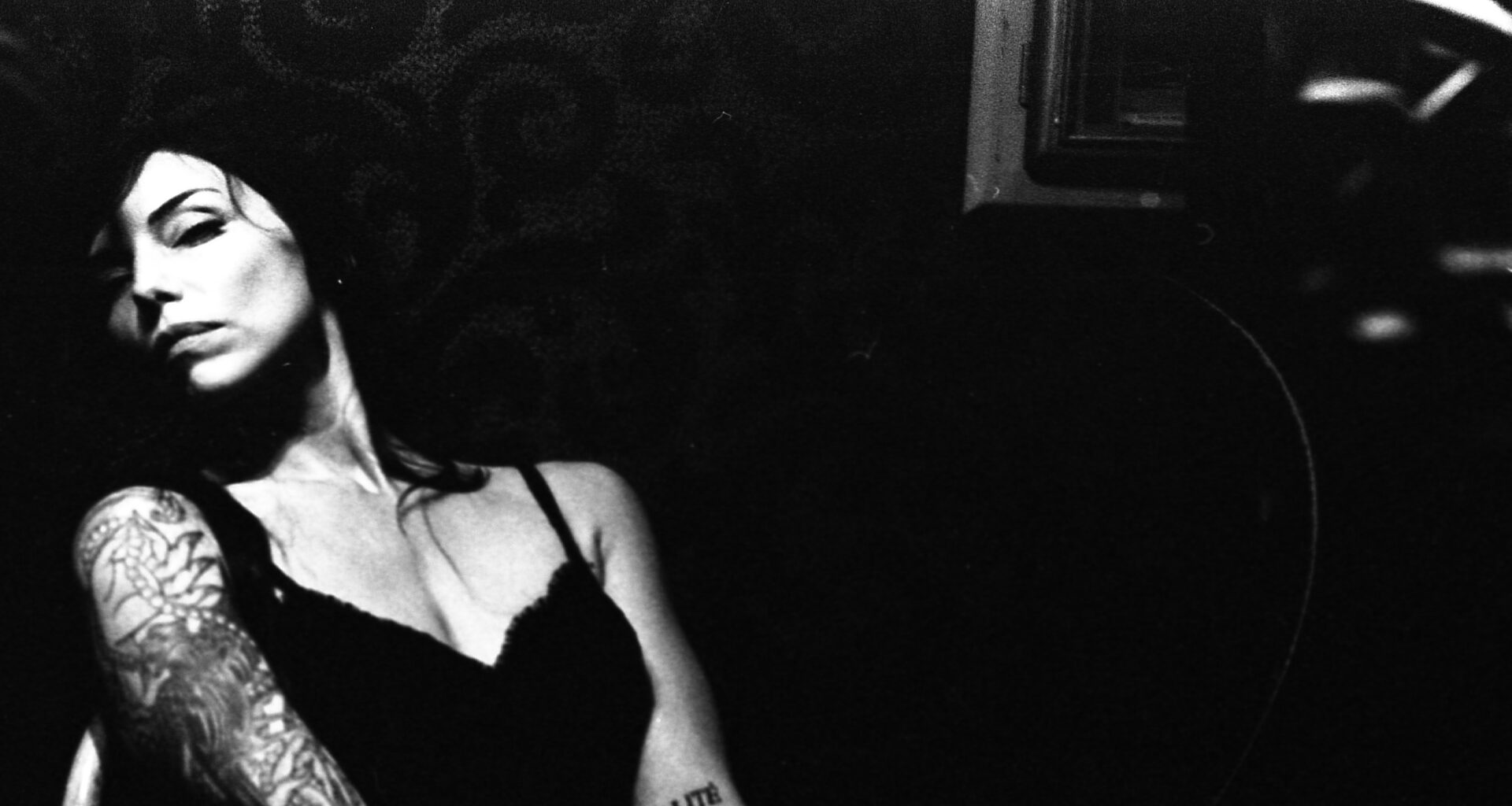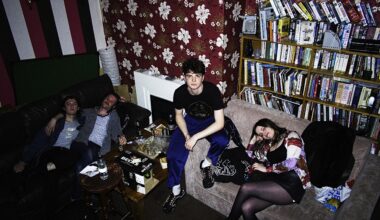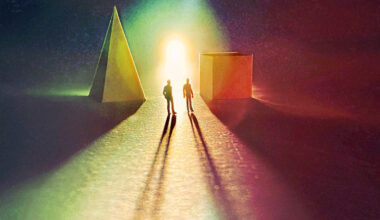DJ? Electronic recording artist? Producer? Soundtrack composer? Drawing on 60s girl groups and epic film scores, Unloved sees David Holmes combining his considerable skills into one deliciously noir-ish album
A mid-century modern interior, somewhere in the US in the 1960s. All is ochre yellow and Danish rosewood. It is the morning after the night before. She goes to empty the ashtray on the coffee table noticing two types of cigarette butts: hers with the traces of shrimp pink lipstick and his without. She clears away the martini glasses, olives bobbing in the dregs, and the plates from which they ate steak béarnaise. The arctic shimmer of expensive French perfume lingers in the air. And just about perceptibly she sighs, for he is gone and maybe ain’t ever coming back. She goes to her turntable and puts a record on full of lovelorn melancholy, seeking solace in the ersatz girl groups of the era and their thousand ululating exhortations of heartbreak and heartache.
The record? It’s not hard to imagine it’s Unloved’s ‘Guilty Of Love’, the latest offering from David Holmes, the renowned Belfast DJ, producer and film soundtrack composer behind scores for ‘The Hunger’ and the ‘Ocean’s Eleven’ trilogy, among others. With Unloved, a collaboration with fellow film and TV composer, Keefus Ciancia, and his partner, vocalist Jade Vincent, they might have just created the perfect retro-pop album in ‘Guilty Of Love’.
Not only is the album immediately catchy and melodic, it is supremely filmic, you could easily imagine it as the next Tarantino soundtrack or even being played in a scene from ‘Mad Men’ or Rona Jaffe’s ‘The Best of Everything’.
“You can’t deny that Jade’s voice comes from another world, a certain time,” reckons Holmes. “When I first heard her sing, nothing new or modern popped into my head as to how I would approach this production. It was all about trying to work with what we had and being faithful to that.”
Her voice, or “the grain of her voice” as Roland Barthes would have it, is a curious mix: at times the mirror-like clarity and theatrics of Nancy Sinatra say, at other times the nasal intonation of Chrissie Hynde.
“You’re not the first person to say that she sounds like Chrissie Hynde,” continues Holmes in his Belfast brogue. “She is like a throwback, she kind of reminds me of a 1950s movie star rather than a singer. If you meet her or see her perform she’s got an incredible look and her voice is so low. I’ve heard some people actually say, ‘Is that a guy or a girl?’.”
Holmes first met Ciancia and Vincent when he was working out in LA on a film soundtrack. Ciancia put on a regular night called The Rotary Room, where a group of disparate, itinerant musicians would come together and form an ensemble and he asked Holmes to DJ between the set ups. He ended up almost producing the live show.
“They were really great nights,” says Holmes, “and then Keefus and Jade asked me to make a record with them.”
With a passion for the work of George “Shadow” Morton, Jack Nitzsche, Ennio Morricone, Nina Rota and the electronic sounds of Raymond Scott, once in the studio, a shared love of film soundtracks spurred the project on.
“I was working on a film called ‘Good Vibrations’ and one of the key artists in that film was The Shangri-Las, so I was just being really, really inspired by this music and this production,” continues Holmes of Unloved’s influences. And so work began – Holmes and Ciancia writing the melodies and taking care of production, while Vincent penned the lyrics.
“It wasn’t like we had an idea from the beginning and it was ‘This is what we’re gonna do’. It was much more scattered, we didn’t really know each other, and Jade had such a unique tone to her voice.”
So the sounds and songs developed gradually, over weeks and months rather than days.
“Once we had an idea we would start bringing in other musicians,” he explains. “We’d work on the shape of tracks and Jade would write some words and we would demo that and then we would record more instruments. We did about 30 tracks altogether, working on some them on and off for months.”
The resulting album, edited down to 12 tracks, enthralls on first listening. There are straightforward girl group pastiches such as the title track ‘Guilty Of Love’ and ‘Damned’, which you find yourself very quickly humming along to, “Damned if you do / Damned if you don’t”, so perfect is this pop. But there are also tracks that allow Holmes and Ciancia to flex their muscles as producers of supreme atmospherics: ‘Silvery Moon’ with its almost whispered vocal and translucent, evanescent soundscapes and the widescreen, epic instrumental of ‘We Are Unloved’, which starts with bells chiming and builds to a swirling chorale.
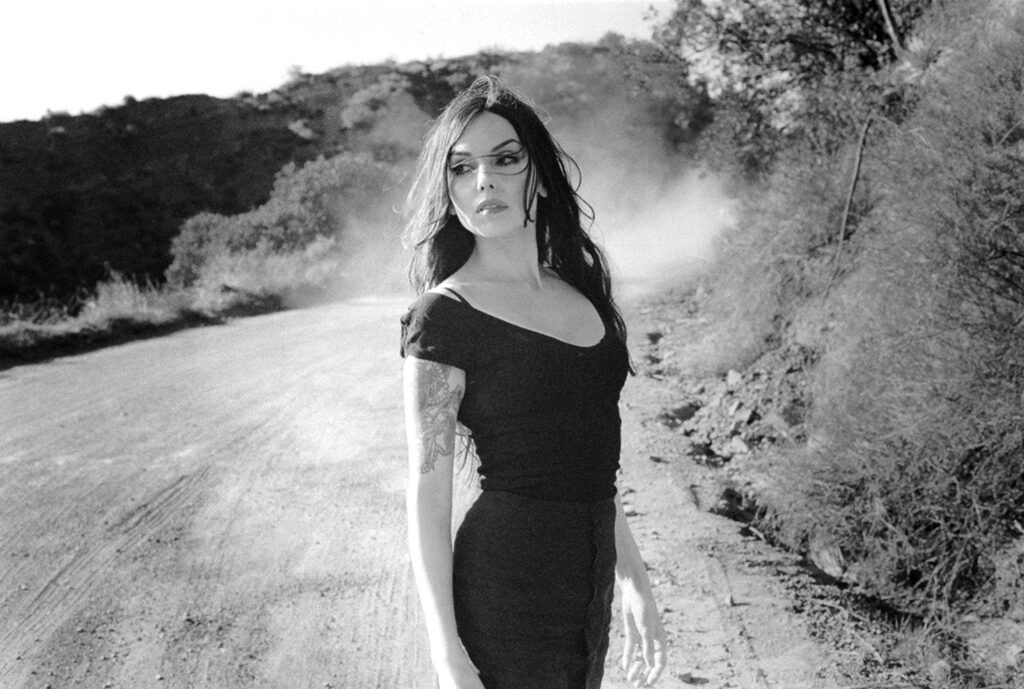
Holmes is very familiar with the work of Phil Spector and his Wall Of Sound production techniques, which have influenced the sound of some of the tracks on this album. When you listen to ‘Xpectations’ with its melodramatic and echoic percussion, the hallmarks of Spector and Jack Nitzsche are all over it. According to Holmes, the secret of recreating the sound lay in the studio itself.
‘Guilty Of Love’ was recorded at LA’s Vox Recording Studios where the 60s sound the trio envisaged could be fully realised. Formerly known as Electro-Vox, the studio was the blueprint for former employee Stan Ross, who after being knocked back for a pay rise in the early 50s went up the street and, with David S Gold, started Gold Star Recording Studios, which was where Phil Spector created his famous Wall Of Sound recordings.
“The studio we were recording in was a living, breathing Gold Star,” says Holmes. “The original Gold Star burnt down in the mid-80s, but it was based on Electro-Vox so it was the blueprint right down to the dimensions of the live room. You would struggle to find any equipment in Vox that pre-dated 1975 so everything was there for us. It’s not rocket science really, if you’ve got the right room and the right mics and the right players you can create that sound.”
It’s a long, long way from the legendary recording studios of LA to Holmes’ hometown, but he still lives in Belfast with his long-term partner and their daughter. Born in 1969, he was the 10th child in a working class Catholic family and grew up during the height of The Troubles in the 1970s.
“As a young kid living in Belfast you’ve seen everything,” he says. “It was all going on outside your house. We had a bomb thrown into our backyard when I was four and sitting in the bath. People were shot dead on the corner of our street, people I knew from school were going into prison. But I had a great family, we were Catholics living as a minority in a mixed area. My mum and dad refused to bring us up in an area that was just one religion. It could have gone the other way, but our family were very, very lucky to get out of The Troubles unscathed.”
However, he did know people who weren’t so lucky. Two of his brothers’ friends were killed, one lived on the same street and another on a street close by. Holmes says they weren’t in any way Republican and were just in the wrong place at the wrong time. At another point, his father was warned that one of Holmes’s older brothers was in danger. “My dad had a brother in Chicago and my own brother came home from work one day as an electrician and within 24 hours he was living in Chicago.”
But it wasn’t all bad. Growing up as one of 10, Holmes says he was exposed to a deluge of music from his older brothers and sisters from a very young age, so he grew up immersed in music and films.
“By the time I was 14 the amount of music I’d been exposed to was unreal,” he recalls of his formative years. “I didn’t have to go to the record shop to find it, it was always in my house. I remember listening to [John Barry’s] soundtrack to ‘Midnight Cowboy’, which is my favourite soundtrack of all-time, I just love the simplicity of it. But then as a youngster in Belfast in the 70s, I spent plenty of time indoors because there was a lot of trouble on the streets. There were times when I just wasn’t allowed out, don’t get me wrong I wasn’t indoors for the entire 70s watching movies. I think when you’re growing up in that working class world all you have really is your imagination.”
So what is Belfast like to live in now?
“Duller,” he says with a laugh. Does he feel happy bringing up his daughter there?
“Oh yeah, Belfast is one of the safest places in the world. It’s very safe, it’s become like any other city, like Manchester or Liverpool.”
When he’s not working on his own projects or behind the desk as an in-demand producer – I speak to him when he’s in London working on Noel Gallagher’s next project – it’s all about film soundtracks. Among his scores are the Hollywood blockbuster ‘Ocean’s Eleven’ trilogy, as well as soundtracks for two films set in Northern Ireland: Steve McQueen’s ‘The Hunger’ and ‘71’. Right from his origins in the late-80s and early 90s as a DJ and dance music producer, film music has been coursing through his veins. Appropriately then, his first foray into the studio with Ashley Beedle in 1992 saw him producing a track called ‘De Niro’.
“In the late 80s, when I started getting into acid house, I used to drop film soundtracks into my DJ set,” he says. “I used to play ‘Once Upon A Time In America’ over the top of ‘My Definition of House Music’ by DJ Hell and I used to drop in atmospheric things like church bells and trains moving off into my sets.”
Does he have a favourite film?
“My favourite film changes daily,” he says. “Last year I directed a short film called ‘I Am Here’ and I threw myself into the world of Andrei Tarkovsky. His films ‘Mirror’, ‘Solaris’ and ‘Nostalgia’ are firm favourites and inspired my film.”
Other films he loves, he says, include ‘Wings Of Desire’, ‘Spirit Of The Beehive’, ‘Performance’, ‘The Killing Of A Chinese Bookie’, ‘Taxi Driver’, ‘The Conversation’, ‘Midnight Cowboy’ and ‘Harold And Maude’. He is keen to point out that film soundtrack is a very different oeuvre to his normal electronic music production. Working with Steve McQueen on the soundtrack of ‘The Hunger’, for example, was a particularly profound experience for Holmes.
“There have been so many bad movies that glamorise Northern Ireland,” he says. “When I met Steve McQueen I thought, ‘Here’s someone who is going to do something extraordinary’. When I read the script I couldn’t hear any music. I thought that was the sound of the film, silence, those moments when you can just hear water drip. So I called him and said, ‘I actually think this film doesn’t need any music’. I wasn’t being clever, I was just being honest and he knew that, so we met up and he said, ‘I want people to really feel the emotion, but I don’t want it to be musical’.”
Get the print magazine bundled with limited edition, exclusive vinyl releases

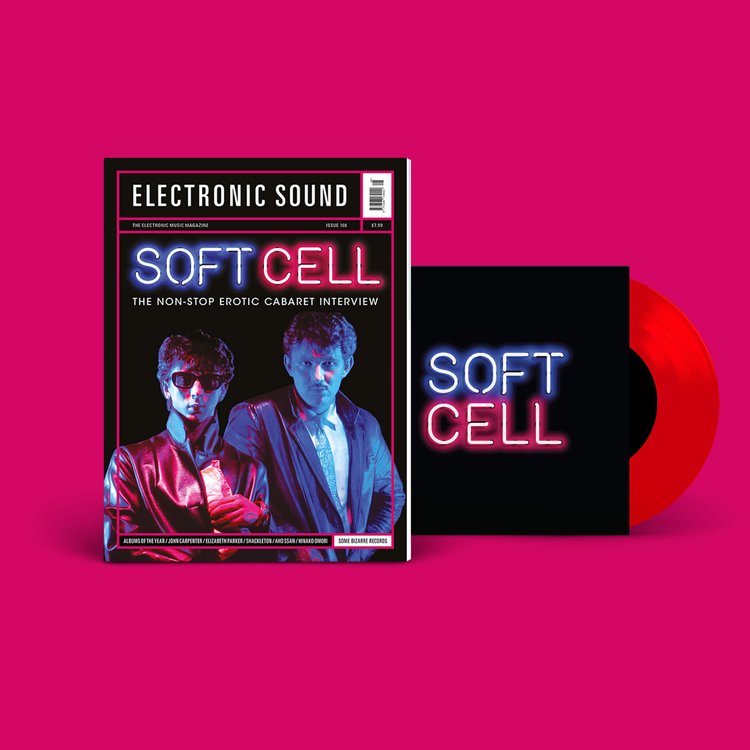
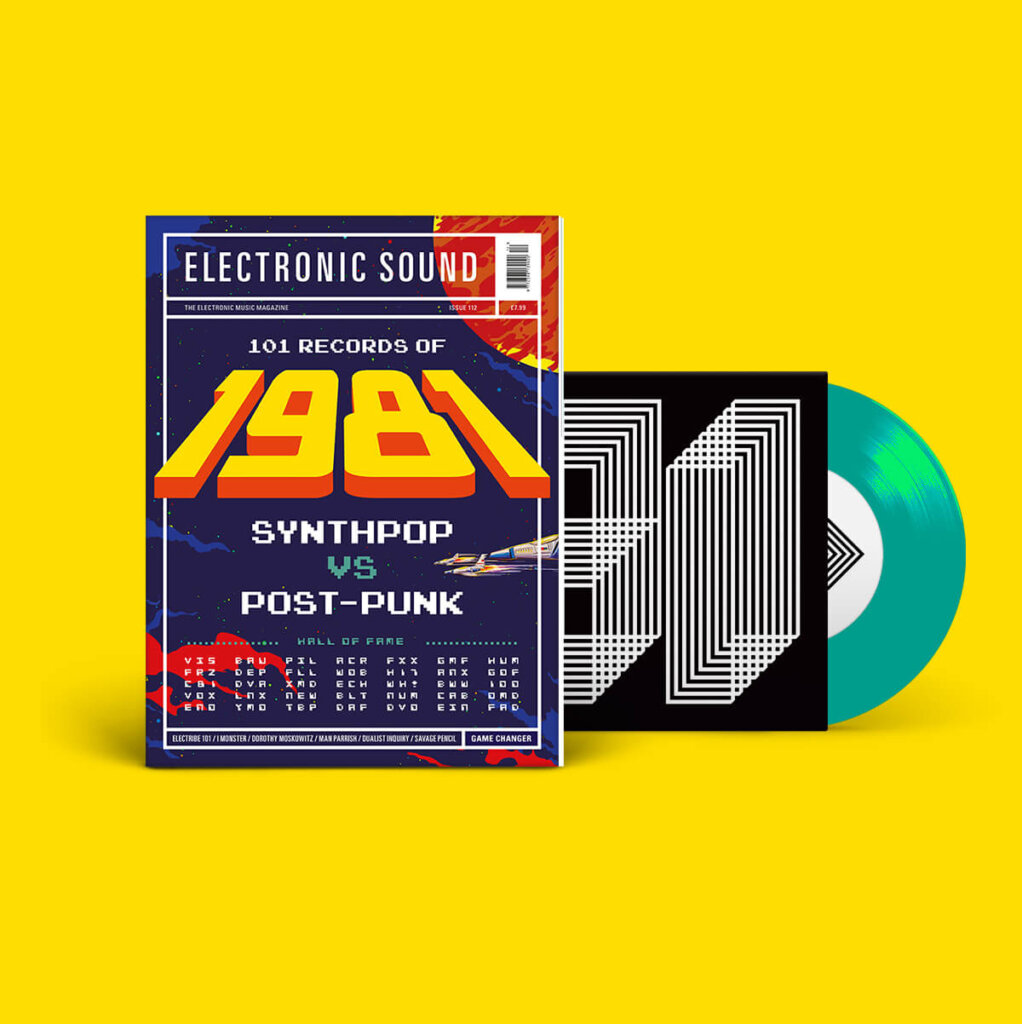
At the time, Holmes had been working on tracks with Leo Abrahams, one of which had a hurdy-gurdy on it, an Hungarian instrument you play by winding it up and adjusting the strings with your fingers.
“It’s basically a drone that has this really strange dynamic incredible harmonics,” he says. “I suggested it to Steve and he used it in the film and that was what he was looking for. To me that was one of the most important lessons I learned about film making – it’s not how much you put in, sometimes it’s about how little you put in and that was a real lesson I learnt from him.”
We’ve only been talking for 40 minutes, but for some reason it feels like hours.
“I do tend to ramble,” he admits. We’ve talked about Unloved, Phil Spector and his Wall Of Sound, his childhood in Northern Ireland, films and film soundtracks… He’s a fascinating guy and, dare I say without invoking a stereotype, in typical Irish style he loves to tell a tale. He tells me he’s got to go because he’s meeting Noel Gallagher in 20 minutes to work on his project. “It’s going to be really, really different, I think people are going to be very surprised in the direction I’m taking him in.”
And somehow I don’t doubt it for a minute.
‘Guilty Of Love’ is out on Unloved Records
